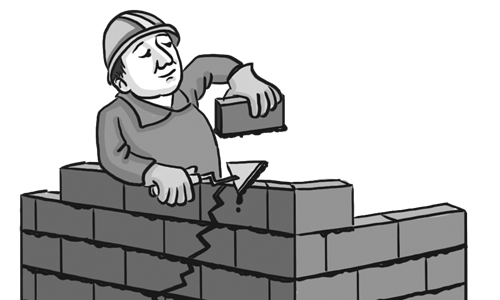HOME >> SOURCE
China needs time to consider impact of trade deal, unlikely to rush into fresh round of talks
By Li Hong Source:Global Times Published: 2020/1/19 22:07:48

Illustration: Xia Qing/GT
With the signing of the phase-one trade deal between China and the US, the 22-month-long tariff escalation is tapering off, which will be a moderate boon to the world economy in 2020. However, seriously disrupted global supply lines are unlikely be repaired anytime soon.Bilateral trade between the world's two largest economies will nonetheless remain at single-digit growth in the new year, as the deal leaves in place punitive tariffs on about $480 billion goods from China and the US, which will stymie business investment and revival of confidence in all major economies.
Governments of Japan, Germany, Britain, France, India, South Korea, Russia and Brazil will have to rely on stimulating low-interest or even negative-interest monetary policy and expanding fiscal spending to prevent their economies from falling into recession.
For the US, the manufacturing sector will continue to struggle in the confusion created by the Trump administration's tariffs. Obviously, Washington has failed to bring back manufacturing plants and jobs to the US, and politicians with limited understanding are feeling humiliated as they confront their broken promises.
Though China's pledge to purchase more than $70 billion worth of goods and services in the agricultural, energy, and manufacturing areas in 2020 will help the US economy a little, most of the costs relating to the tariffs on Chinese imports will be borne by Americans, in the form of lower profits for US companies or higher retail prices for households. The intelligence of American politicians in stubbornly refusing to abolish tariffs seems greatly in doubt.
The remaining duties will not only suppress US business confidence and the country's manufacturing industry, but also function as a sword of Damocles hanging over Wall Street, as the US equities market - which the Trump administration puts weight on in the broader economy - carefully considers the tariffs, and investors become more risk aversive. Investors are spooked by the tariffs and will not want to take a chance.
Perhaps US politicians are hoping to extract more concessions from China in the future, using the removal of remaining tariffs on Chinese imports as bait. But, China will certainly need time - at least a couple of years - to see how the phase one agreement works out, particularly the trade pact's ramifications in respect of local economic performance. If the economy is adversely impacted, China's government is highly unlikely to jump into so-called phase two negotiations with the US.
Besides, the Chinese people will have no appetite for any external force attempting to coerce the country to revise its basic system -socialism with Chinese characteristics, put in place by the revered late Chinese leader Deng Xiaoping.
Under the terms of the phase one deal, China will broadly open its financial services sector to foreign institutions and individual investors - which will boost the competitiveness of Chinese banks, insurers, security brokers and credit assessors. But, this is no grounds for China to give up on its state-owned sector, by making state-owned enterprises all private.
China's socialist public welfare system - pensions and medical care insurance in particular - has preeminent advantages over the US capitalist system, because of the significant contributions from China's state-owned companies. As their annual profits and equity assets flow into the national social welfare fund, so China's 1.4 billion people are effectively insured and protected.
In the US, private business titans invariably live a distinctively luxurious life, while a fifth of the population struggle in dire economic straits, experiencing mediocre wages, declining pensions and scant medical cover. The growing mass of urban homeless, from Los Angeles to Detroit to Baltimore, is the result of the ills of the US economic system.
So, the Chinese people welcome the ceasefire and resumption of dialogue to the alternative - a further escalation in trade and economic hostilities. But Washington must not count on phase two talks pressurizing China to change its basic economic structure. Last summer, talks between the two countries were in deadlock because Washington was asking for things that China could never agree to, that is the remaking of China's entire economic system.
Will the phase one trade deal lead to a stable and permanent economic and political relationship between the two economic giants? It's too early to tell. So long the US does not consider China as an antagonist, and the two countries try to build trust as equal negotiating partners, with respect for each other's basic systems, there will be plenty of space to cooperate in many domains to the benefit of the world.
The author is an editor with the Global Times. bizopinion@globaltimes.com.cn
Posted in: COLUMNISTS